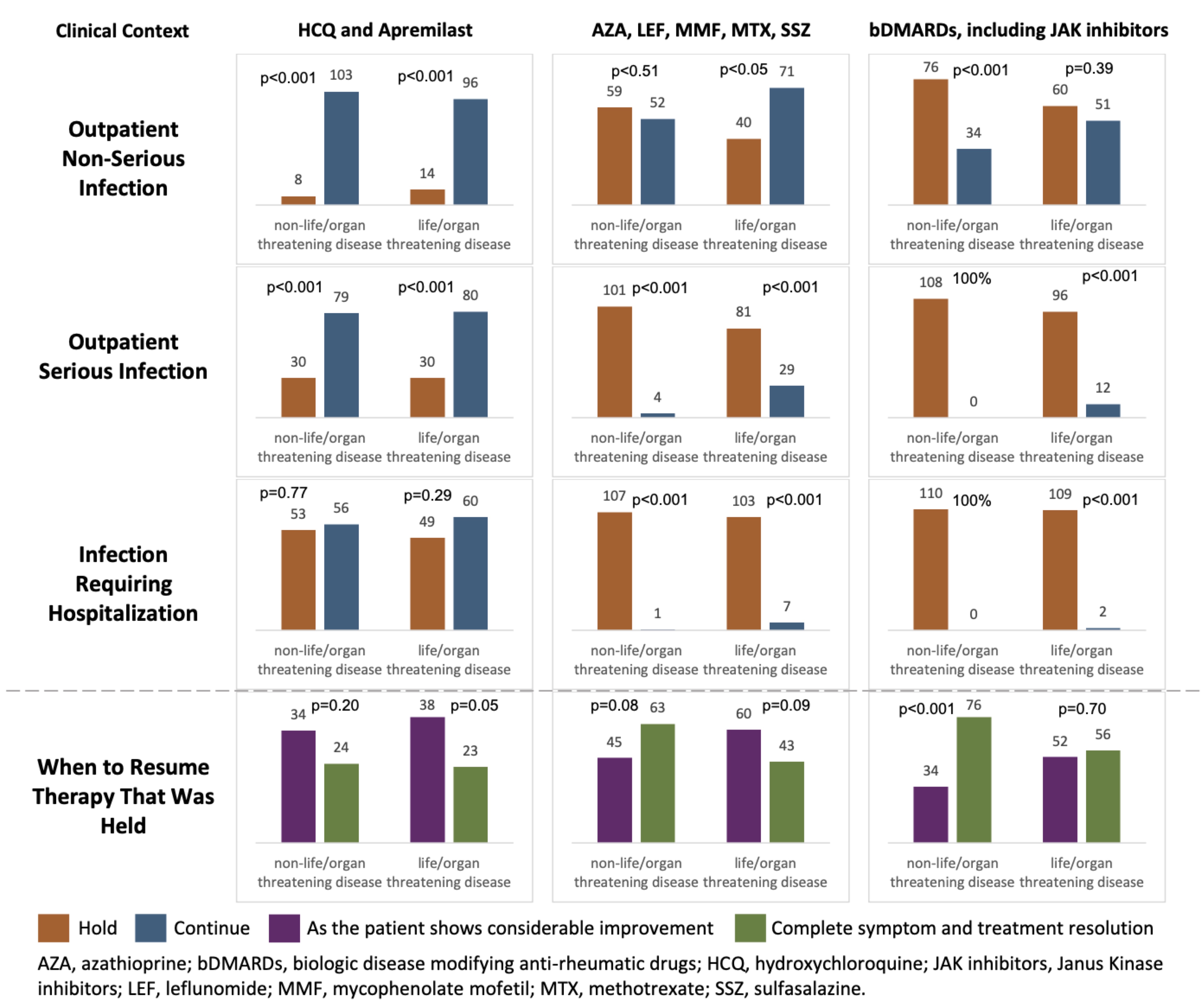Session Information
Date: Tuesday, October 28, 2025
Title: (2015–2051) Miscellaneous Rheumatic & Inflammatory Diseases Poster III
Session Type: Poster Session C
Session Time: 10:30AM-12:30PM
Background/Purpose: Disease-modifying antirheumatic drugs (DMARDs) vary widely in their immunosuppressive activity. Guidance on managing DMARDs during acute infections is limited, particularly regarding when to hold or resume therapy. This study aimed to investigate clinical practice patterns among rheumatologists concerning management of DMARDs during acute infections, stratified by type of immunosuppression, degree of infection, and disease severity.
Methods: A 27-question survey was distributed to rheumatologists via professional networks and academic listservs; responses were anonymous. Questions assessed clinical decisions on holding/restarting DMARDs during varying severities of acute infection, in patients with either life/organ-threatening or non-life/organ-threatening rheumatic disease. Infections were categorized as: i) outpatient non-serious (unlikely to require hospitalization, may not need treatment), ii) outpatient serious (may require hospitalization if not improving), and iii) requires hospitalization. DMARDs were grouped by immunosuppressive risk, from lowest to highest: 1) hydroxychloroquine (HCQ) and apremilast, 2) conventional synthetic DMARDs (csDMARDs: azathioprine, leflunomide, methotrexate, mycophenolate mofetil, sulfasalazine), and 3) biologic DMARDs (bDMARDs) including Janus kinase (JAK) inhibitors. Chi-square tests compared binary responses, with significance defined as p < 0.05.
Results: A total of 113 rheumatologists participated: 63% private practice, 34% academic; ages ~30-90 years, from 25 states and D.C. Responses are summarized in Figure 1. Depending on scenario, 73-93% of rheumatologists would continue HCQ and apremilast during outpatient infections (p < 0.001). Responses were split for infections requiring hospitalization in both non-life/organ-threatening and life/organ-threatening disease (49%, 51%, and 45%, 55% respectively). 64% would continue csDMARDs for non-serious outpatient infections in patients with severe diseases (p < 0.05); responses were split 47% and 53% in less severe disease. 69% would hold bDMARDs and JAK inhibitors in non-serious outpatient infections without severe disease (p < 0.001), with divergent responses (54%, 46%) for life/organ-threatening disease. Depending on the context, 74-100% would hold csDMARDs and bDMARDs/JAK inhibitors during serious outpatient infections and infections requiring hospitalization, regardless of disease severity (p < 0.001). 77% would restart biologics only after full resolution of symptoms and completion of treatment in non-life/organ-threatening diseases (p < 0.001). In all other contexts there was no significant majority regarding when to restart therapy. Academic physicians were more likely than private physicians to continue treatment in milder infections, particularly in more severe rheumatic diseases, and to resume DMARDs earlier (Figure 2).
Conclusion: There is substantial variability among US rheumatologists in the management of DMARDs during acute infections. These findings highlight a significant knowledge gap and suggests that development of guidelines on this topic would help inform clinical decision-making and standardize care.
 Figure 1. Rheumatologists’ Views on Holding DMARDs During Infection
Figure 1. Rheumatologists’ Views on Holding DMARDs During Infection
.jpg) Figure 2. Rheumatologists’ Views on Holding DMARDs During Infection, Based on Type of Practice
Figure 2. Rheumatologists’ Views on Holding DMARDs During Infection, Based on Type of Practice
To cite this abstract in AMA style:
Gellman M, Sen M, Schwartz A, Merkel P, Mbuyi N. To Hold or Not to Hold: Variability in Management of DMARDs in the Setting of Acute Infections – A Survey of Rheumatologists [abstract]. Arthritis Rheumatol. 2025; 77 (suppl 9). https://acrabstracts.org/abstract/to-hold-or-not-to-hold-variability-in-management-of-dmards-in-the-setting-of-acute-infections-a-survey-of-rheumatologists/. Accessed .« Back to ACR Convergence 2025
ACR Meeting Abstracts - https://acrabstracts.org/abstract/to-hold-or-not-to-hold-variability-in-management-of-dmards-in-the-setting-of-acute-infections-a-survey-of-rheumatologists/
